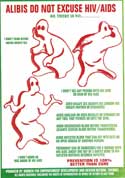The Politics of Women's Health
In Translation: HIV Activists Travel on Foot and by Canoe to Raise Awareness
The "In Translation" sidebars in the 2011 edition of Our Bodies, Ourselves highlight the work of our global partners who develop health resources based on Our Bodies, Ourselves for their own communities.
 |
Group: Women for Empowerment,
Development, and Gender Reform
Country: Nigeria
Resource: Print and nonprint materials based on Our Bodies, Ourselves in pidgin English and Yoruba | WEDGR created this poster with culturally relevant information for distribution in rural Nigeria.
Nigeria’s growing AIDS epidemic is attributed to a number of factors, including limited access to sexual health information; a failing health system unable to provide testing and care to large segments of the population; and cultural practices such as polygamy and early marriage that leave women and girls disproportionately vulnerable to infection.
Though HIV prevalence is even higher in South Africa and Zambia, Nigeria’s ethnic and political structure has hampered effective wide-scale intervention. This has made grassroots groups—such as Women for Empowerment, Development, and Gender Reform (WEDGR), Our Bodies Ourselves’ partner in Nigeria—critical to the global fight on HIV transmission, prevention, and care.
WEDGR is adapting content from Our Bodies, Ourselves into local dialects— Yoruba and pidgin English—and using creative ways to bring information to those who most need it. The organization is raising awareness in communities with the highest numbers of HIV-positive women in the country through outreach on the local canoe system that ferries passengers from remote farms to markets; peer educator training for village hairdressers; an outreach walk to cover a wide network of villages; and a groundbreaking effort to sensitize and include men as partners in change.
Successes, however, have been hard won, with challenges ranging from rising fuel costs to reluctant male participation. Stigma attached to the virus has also generated anger against WEDGR, resulting in a brutal and fatal attack on outreach workers in 2009. This was followed by a deliberate fire that destroyed the organization’s office. More recently, members of the project team were kidnapped and released after a month in exchange for ransom paid by family, friends, and community chiefs.
In the aftermath of these terrifying incidents, WEDGR remains steadfast in its commitment to building conciliatory bridges and raising consciousness about HIV. Nonetheless, the experience is a disheartening reminder of the danger human rights defenders face as they take on the most urgent social and health issues. WEDGR hopes its story will mobilize the global community to rise in defense of activists around the world.
Excerpted from the 2011 edition of Our Bodies, Ourselves. © 2011, Boston Women's Health Book Collective. You can read other "In Translation" sidebars about women's groups who are adapting Our Bodies, Ourselves and creating resources to advance the health and human rights of women and girls in their countries. Click here to read more about WEDGR.
< Return to The Politics of Women's Health Overview
|




